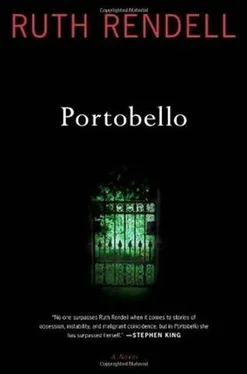'Really?'
'If they have delusions, these mice, what do you think they hear? Strange squeaks telling them to do bad things? Telling them to kill other mice? What about hallucinations? Do you think they see sabre-toothed cats, big as tigers?'
He began to laugh. She thought she had never heard him laugh before. The receptionist put her head round the door and said Mr Roseman's cab had come.
Eugene had lost the argument and lost it with good grace. It's too early to go to Sri Lanka in August, Dorinda told him. You go to India and neighbouring countries in January. Surely he remembered when the tsunami was. Why did he think all those holidaymakers were in south-east Asia in midwinter? So Eugene gave in and they fixed on Lake Como.
It was two months away. He had more or less resigned himself to the impossibility of giving up his habit in those seven or eight weeks. Like a smoker, like an alcoholic, he had cut down. This was achieved, as cutting down usually is, by making sure that he carried none of his fix about with him, kept none at the gallery – it too had once contained caches in secret drawers – avoiding streets where purveyors of Chocorange had their premises and responded to his craving by having a glass of water. But he had never passed a whole day without a suger-free sweet and he still kept eight packs in their plastic bag behind the Forster novels in his bookshelves, and three more in a drawer in the spare bathroom cabinet. These were not to be touched, certainly not ever to be looked at or checked on. They were his emergency supplies for use if, for instance, he broke his leg and was housebound or got the flu. It was a measure of how Chocorange was driving him mad that he thought seriously of such eventualities as a smoker might lay in four or five packs of cigarettes and a drinker his bottles of vodka. But how much more dignified than his were their addictions!
They were recognised and in their way accepted. Alcoholism might be something to be a bit ashamed of but people with a forty-a-day habit regularly talked to journalists about their indulgence and, with a laugh, conceded they 'must give up one day'. He imagined being interviewed as a gallery owner about to hold an exhibition of a promising young artist's work (as indeed he was to do next month) and saying in answer to the (no doubt impertinent) questions about his private life that he was fiftyone years old, lived in Notting Hill, was about to marry a beautiful and charming general practitioner… and was hopelessly addicted to a particular flavour sugar-free sweet. He couldn't pass a day without sucking the sweets. The whole thing was impossible. It was beyond measure ridiculous. To coin a doubly appropriate phrase he would never use, it sucked.
Of course he would never say such a thing to a journalist or anyone else. As with the secret alcoholic and his covert drink pushed to the back of the fridge shelf when his wife walked in, his gin which looked like water when no ice or lemon was added, he could never allow anyone else to know. If he encountered Elizabeth Cherry in the street or saw George Sharpe over the garden wall, the Chocorange he was sucking was surreptitiously slipped into the tissue he kept in his pocket solely for that purpose. And even that prudent move distressed him. It was such a waste. He still had to decide how to handle his addiction while on his honeymoon. Total denial was impossible. You were supposed to enjoy your honeymoon. But he and Ella would be away for two weeks and the idea of being deprived of his fix for a whole fortnight didn't bear thinking of. He hated the idea of those Customs people, or whoever it was X-rayed and searched one's checked baggage, finding eight chocolate-brown-and-orange packs, say, inside one of his suitcases. He couldn't imagine denying himself his sugar-free sweets but he could well picture the faces of those officials staring at their screen, shaking their heads, laughing at the chav who wanted his sweeties in a luxury Italian hotel.
But he would have to take them if he was not to suffer deprivation. Only vaguely aware of what withdrawal symptoms might be, he nevertheless thought he had them. He had his own kind. Finishing the modest lunch he was eating in a bistro in the Haymarket – Ella had phoned to say she couldn't make it – he had begun to feel the craving that came to him most acutely when he had been eating something savoury. His mouth went dry. Drinking water only served to bring him another manifestation of his longing – a need for some sweet but sharp flavour on his tongue. The waitress had brought him two very small biscotti with his coffee. He ate them disconsolately.
Beginning one's packing at least a week before one went on holiday was a habit Elizabeth Cherry's mother had instilled in her some seventy years before. You spread a sheet on the bed in one of the spare rooms, laid your suitcase on the sheet and began. Her mother hadn't used suitcases but a cabin trunk made of thick, polished, brown hide, lined in silk and with cedar wood hangers. It was immensely heavy even before there was anything in it but that didn't matter as you never carried it yourself. Porters did that, it was their job. Elizabeth used one modest case and a carry-on bag but she still spread out the sheet and laid her luggage on it. Whenever she bought something wrapped in tissue paper she saved the paper for her packing. A sweater or blouse was laid flat on one sheet, another laid on it before it was folded and a third on top. Then all was placed inside the case. Shoes were put inside plastic bags. She prided herself on not taking too much. If what she took with her turned out to be inadequate, she reasoned, she could always buy something. She never did.
The packing done, she opened the drawer where, in envelopes, she kept foreign currency. Since the widespread use of the euro, the number of envelopes had much decreased. She would need euros and, as she would be passing through Switzerland, Swiss francs. This drawer was visited no more than twice a year and it always surprised her. How had she collected so many US dollars? Nearly five hundred? She couldn't remember how it had come about that such a lot had been accumulated. And there were far more euros than she wanted to carry on her. Better take one of the credit cards from the desk downstairs for use in a cash machine. It was years since she had been to Canada yet here were more than three hundred Canadian dollars. They could stay where they were, as could the American money.
Remember to close all the windows, she told herself. Not that she had opened any with all this rain falling daily. The child who had got in and eaten the cake might come back. Window locks might be a good idea but arranging for these to be fitted would have to wait until after she came back. How about her jewellery? She only thought about her jewellery when she was about to go away on holiday. The rest of the time the two bracelets and the eternity ring her dead husband had given her, her mother's rings and heavy gold chain, remained in the jewel box and were never looked at. But the evening before going away for two weeks she worried about them. They were insured, after all. Every time she went away she considered taking them all with her. But considering was all she did. Imagine the nuisance going through security, that arch thing you walked through beeping so that some grim-faced woman in uniform searched you. Imagine putting them all in one of those plastic trays so that everyone could see exactly what you'd got. No, best leave them where they were. They had always been all right and they would be this time.
No mention was made of the jewellery when Elizabeth went next door at six o'clock to remind her neighbour to water her house plants and take in any parcels that might arrive at number 25 in her absence. As she always did when Elizabeth called, at any rate after four, Susan said she was just about to have a small sherry and would Elizabeth join her. Elizabeth was fond of sherry, a civilised drink that seemed to be fast disappearing from all but the drinks cabinets of those over seventy, and she sat down.
Читать дальше











